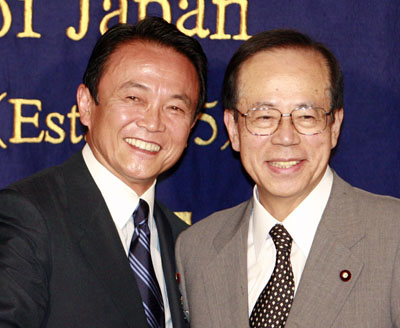|
|

|
|
RISE AND FALL: Japanese Prime Minister Yasuo Fukuda (right) shakes hands with former Foreign Minister Taro Aso at a meeting in Tokyo in September 2007 |
Then in late August, a political scandal emerged involving Agriculture, Forestry and Fisheries Minister Seiichi Ota. A political group supporting Ota, who was appointed in a cabinet reshuffle on August 1, reported more than 23 million yen ($215,000) in office costs for 2005 and 2006, even though Ota's Tokyo office was in his policy research secretary's home. The scandal was a heavy blow to the Fukuda administration, Jin said. It not only damaged the government's image among the Japanese people, but also became a political weapon for the opposition.
Parliamentary deadlock was another problem for the Fukuda administration, said Liu Jiangyong, a Japanese studies professor at Tsinghua University. In an article published in People's Daily, he said that the Abe administration left a big "burden of history." In the 2007 election, the LDP lost its majority in the upper house for the first time since its founding in 1955. Control over the House of Councillors passed to the opposing Democratic Party (DP), while the lower house is still run by the LDP and the New Komeito Party in a coalition government.
Fukuda therefore had his hands tied by political stalemate. Under the Japanese Constitution, the government must submit all draft laws, resolutions and budget plans for parliamentary approval, Liu explained. With the opposition controlling the upper house, Fukuda government proposals were easily delayed or denied. Earlier this year, the DP vetoed Fukuda's first two nominees to run the central bank.
In June, the House of Councillors passed a non-binding censure motion against Fukuda, formally reprimanding a sitting prime minister for the first time under Japan's post-war constitution. Although Fukuda reshuffled his cabinet on August 1, the situation did not improve.
Jin gave another possible reason for Fukuda's resignation, noting Japan's upcoming general election. Before his resignation, Fukuda announced an extraordinary Diet session to be held later this month to address outstanding items from the last legislative meeting. As the weakened prime minister had little chance of passing his economic stimulus package and other measures during the meeting, the LDP would be tarnished in the general election. Fukuda had two choices: dissolve the lower house and hold an early election the LDP might lose, or resign. "Considering the LDP's interest, Fukuda chose to resign," Jin concluded.
Who's next?
According to the latest reports, seven candidates are expected to contest the LDP leadership election on September 22. The star candidates include former Japanese Foreign Minister Taro Aso, former Defense Minister Yuriko Koike, former Defense Minister Shigeru Ishiba and Economic Minister Kaoru Yosano.
|
